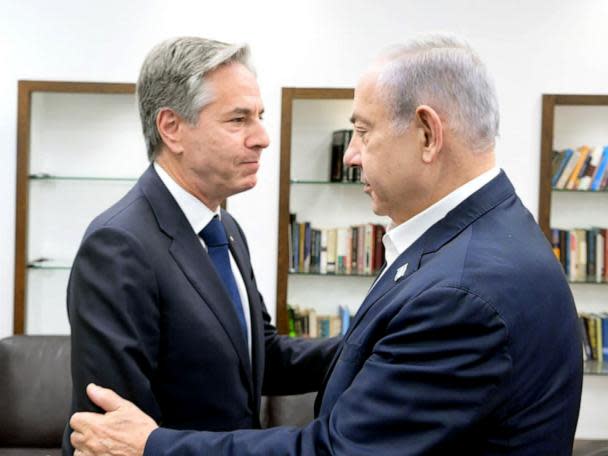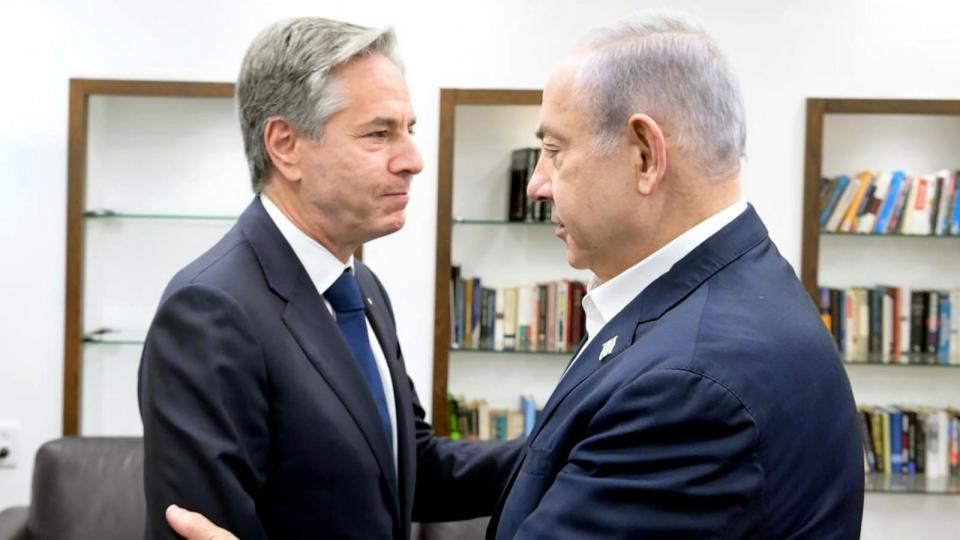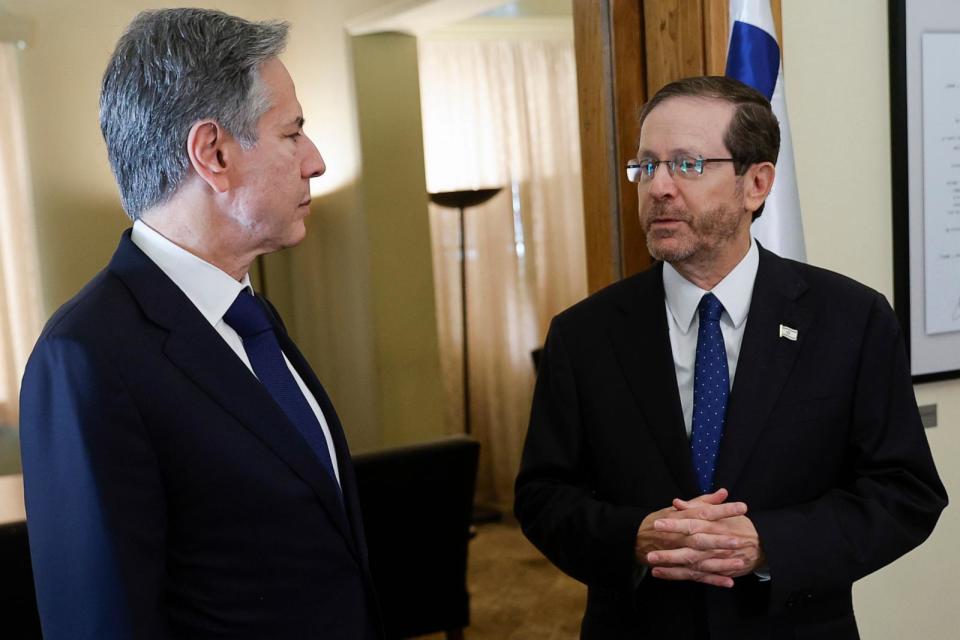Blinken's increased pressure on Israel over 'pauses' signals shifting US strategy: Analysis

Secretary of State Antony Blinken said Friday he used his most recent face-to-face meeting with Israeli Prime Minister Benjamin Netanyahu to make the U.S. case for temporary pauses in the fighting, which he argued were critical to protecting civilian lives, allowing humanitarian aid to move into Gaza and boosting efforts to free the scores of hostages held in the enclave for nearly a month -- laying out the administration’s updated strategy for managing fallout from the conflict.
"We believe that each of these efforts would be facilitated by humanitarian pauses, by arrangements on the ground that increased security for civilians and permit the more effective and sustained delivery of humanitarian assistance," Blinken said during a press availability on Friday.
"We see it as a way also and -- and very importantly -- of creating a better environment in which hostages can be released," Blinken added.

Netanyahu appeared to reject Blinken’s plan -- calling for Hamas to release its hostages before he would consider any type of cease-fire. The Biden administration itself has resisted calls for a general cease-fire, which officials have distinguished from the pauses.
The secretary did not say whether Netanyahu had offered any assurances behind closed doors, but he said that discussions with Israeli leadership and other partners in the Middle East would press on.
"A number of legitimate questions were raised in our discussions today, including how to use any period of pause to maximize the flow of humanitarian assistance, how to connect a pause to the release of hostages, how to ensure that Hamas doesn't use these pauses or arrangements to its own advantage," Blinken said. "These are issues that we need to tackle urgently, and we believe they can be solved."
The Biden administration's subtle shift in tone on Israel's approach has already begun to lay the groundwork for this development, as top officials have increasingly urged Israel protect civilians and allow space for diplomacy as it carries out its campaign.
Previewing critical goals for his trip on the tarmac of Joint Base Andrews on Thursday, Blinken said mitigating collateral damage would be "very much on the agenda."
"We will be talking about concrete steps that can and should be taken to minimize harm to men, women and children in in Gaza, and this is something that the United States is committed to," he said. "When I see a Palestinian child, a boy or a girl, pulled from the rubble of a collapsed building, that hits me in the gut as much as seeing a child in Israel or anywhere else. So this is something we have an obligation to respond to, and we will."

Blinken added that he was also "intensely focused" on freeing the more than 240 hostages that Israeli officials say are still being detained by Hamas after it launched a surprise terror attack on Israel on Oct. 7, as well as ensuring American citizens and other foreign nationals can continue to exit Gaza through the Rafah crossing into Egypt.
"Good news. We got out today 74 American folks out," President Joe Biden announced in the Oval Office on Thursday, referencing the number of U.S. citizens that have been allowed to leave the besieged enclave following an agreement to allow some individuals to cross into Egypt for the first time since Gaza's borders were sealed off in the aftermath of Hamas' rampage.
The administration estimates that there are still over 300 Americans and hundreds more of their immediate family members waiting to leave, and U.S. officials have warned that the situation remains tumultuous -- as every movement into and out of Gaza is the result of intense negotiations among multiple parties with competing interests.
"I think we need a pause," Biden said after he was interrupted by a protester calling for a cease-fire at a fundraising event on Wednesday night, saying it would "give time to get the prisoners out."
Later, White House spokesperson John Kirby said the administration would "explore the idea of many pauses" as part of its "work to get people out safely, including hostages."
"What we're talking about are temporary, localized pauses in the fighting to meet a certain goal or goals," he explained.
U.S. officials have argued these pauses would not equate to a cease-fire, saying that a cease-fire would mean a prolonged break in fighting that they say would give Hamas the chance to regroup. But they have also acknowledged they have no expectation that Hamas militants or other designated terrorist groups operating in the region will adhere to the terms of even a short-term truce, meaning that the administration's efforts to create pauses are focused solely on Israel.
There's already some evidence to suggest that the Biden administration's increased focus on the plight of the Palestinians is benefiting Americans directly impacted by the conflict.
Officials familiar with efforts facilitate the exit of foreign nationals from Gaza say Qatar -- which has proven to be influential with Hamas, whose leaders have been hosted in its capital of Doha for years -- helped push through the impasse, but that the departures were also made possible by the success of U.S.-led push to steadily ramp up the amount of humanitarian aid allowed to enter the region.
Sustaining that cooperation at that crossing requires maintaining cooperation with Middle Eastern leaders -- including many who have called for an end to the bombardment of Gaza for weeks. Israel has been warning civilians to leave the area for weeks.
"Without [a cease-fire], the United States will find its moral authority in the Middle East increasingly diminished, especially among its partners in the region and an Arab public that is mobilizing at levels not seen since the Arab Spring revolutions," said Elham Fakhro, an associate fellow with the Chatham House Middle East and North Africa program.
While the administration has shown no willingness to bend that far, as Biden and Kirby suggested, the administration hopes that achieving sustained pauses in the conflict may boost diplomacy and jumpstart the plodding pace of negotiations to free the scores of hostages still held in Gaza.
"Both domestic and international pressure to prioritize the hostages, perhaps even including some sort of cease-fire, has been building, alongside opposite internal demands for continuing the massive retribution against Hamas," said Paul Scham, a non-resident scholar at the Middle East Institute.
But some, like Richard Goldberg, a senior advisor at the Foundation for Defense of Democracies and former National Security Council official, fear the administration may give up too much in the process -- inadvertently benefiting U.S. adversaries.
"Qatar is coordinating this hostage negotiation with Hamas and Iran to produce maximum benefits for all three. Qatar is a Hamas ally, sponsor, and host. It has no business running a hostage negotiation on anyone's behalf," Goldberg said.
The U.S. has designated Hamas a terrorist organization.
While the administration remains steadfast in its affirmation of Israel's right to defend itself, it is also increasingly aware of the political problem created by the perception among some Palestinian and Arab Americans that the president has turned a blind eye to suffering inside Gaza.
The White House's announcement on Wednesday that it would develop a national strategy to combat Islamophobia was seen by many as a step aimed at limiting backlash from Democrats, and Kirby suggested that the president wouldn't support legislation, passed by the House Thursday evening, that provided funding only for Israel's national security and ignored the administration's other requests, which include humanitarian aid for Gaza.
"The president would veto an only-Israel bill," Kirby said on Thursday. "I think we've made that clear."
ABC News' Mary Bruce and Molly Nagle contributed to this report.
Blinken's increased pressure on Israel over 'pauses' signals shifting US strategy: Analysis originally appeared on abcnews.go.com

 Yahoo News
Yahoo News 
